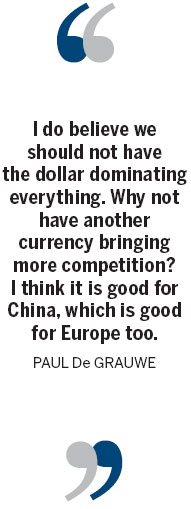The blueprint's looking good

| Paul De Grauwe says the strong euro has made it difficult for Europe to export to China and the US. Provided to China Daily |

Belgian professor sees reshaping of Chinese economic model as good for Europe
As lawmakers and political advisers meet in Beijing to discuss China's social and economic blueprint, Professor Paul De Grauwe sees China's shift from an investment and export-driven economy to a consumption-led model a "positive shift" that could help revive the European economy.
"I think this would be a happy development for Europe, not only for China," says De Grauwe, former economic policy adviser to the European Commission and president and professor at the London School of Economics and Political Science.
Rebalancing the Chinese economy to make it more consumption-based would also create more opportunities for Europe to export more to China, he says.
The 2008-09 financial crisis and the European sovereign debt crisis have shown the Chinese government the risks of being overly dependent on exports, De Grauwe says.
Meanwhile, China's market of increased internal consumption continues to take shape as the middle class expands. As the National People's Congress, the legislative body, and members of the Chinese People's Political Consultative Conference, the political advisory body, hold their annual meetings, they are expected to draw up measures on how exactly to rebalance the economy, a decision made by the country's leaders at the 18th National Congress of Communist Party of China in November last year.
"That would certainly be something Europeans would be happy to have," says De Grauwe, who is also professor of international economics at the University of Leuven in Belgium.
De Grauwe says China's continuing urbanization and industrialization will create more export opportunities for Europeans. Meanwhile, the expanded middle class will consume more European goods, and more and more Chinese are showing an interest in Europe as tourists or as investors.
But he believes trade between China and Europe has been way out of kilter, leading Europeans to fear many of their industries would fall victim to this imbalance.
"If you move in the direction of rebalance it will certainly reduce this fear and create a potentially more balanced relationship."
But China is not entirely to blame for the imbalance, De Grauwe says.
"We have to do our homework as well. If we keep the euro too strong it will also make it more difficult for China to rebalance."
De Grauwe says finding a correct balance between the euro and the renminbi will also allow the European Union to discover more markets in China. A weak euro will help rebalance China's economy by boosting European exports.
"We should take away the fear factor about China, and see it as bringing more opportunities and chances to Europeans so that we can develop a mature relationship," he says.
He also feels the aggressive monetary policy of the US Federal Reserve and Japan's reaction has helped keep the euro strong, he says.
"Basically, the policy of the Federal Reserve has been very aggressive. Weakening the dollar will result in the Japanese weakening their currency, and as a result we have got a strong currency as we don't do that."
The strong euro has made it more difficult for Europe to export to China and the United States, he says.
"We should go to a more balanced relationship, otherwise people will start reacting like Americans in the past - protectionist measures against China."
He says the European Central Bank needs to adjust monetary policy to allow the euro to depreciate.
"But I find it difficult to predict. It depends on the bank's willingness."
De Grauwe says the internationalization of the renminbi is an important development.
"I do believe we should not have the dollar dominating everything. Why not have another currency bringing more competition? I think it is good for China, which is good for Europe too."
In dealing with China's growing economic muscle, he thinks the world has to liberalize its financial relationships at some point, which is also a prerequisite for the renminbi to become an international currency.
As global expert on monetary affairs, De Grauwe says he has been interested in China's development and has recently done research on the potential benefits of financial liberalization in China and what that could mean for Europe.
De Grauwe says the EU is on the right track to solve the sovereign debt crisis, even if things are moving slowly. The crucial thing that happened last year was the decision of the ECB to commit itself to supporting bonds issued by the member states, he says, something he had urged it to do two years ago.
"The ECB was the only institution that could have saved the eurozone, and if it had not acted, the eurozone could not have been maintained. Happily, it did something and it has turned out that in committing itself 100 percent they were able to stop the panic."
But what has been less positive is economic growth, he says. In fact, the eurozone is experiencing a double-dip recession, and that creates new risks, social and political, in certain European countries where the recession is deep.
De Grauwe says that in some ways it evokes the days of the Great Depression in the 1930s, with unemployment in some countries as high as 30 percent, and in some countries one in two young people out of work.
"If it is not solved quickly, I'm afraid the stability of these countries is in danger, especially where these young people have no work prospects."
Facing this, De Grauwe says the ECB could do more to contribute to stimulate the economies of countries in deep recession such as Greece, Spain, Portugal and Ireland.
The bank has made it clear that it is willing to buy unlimited amounts of government bonds, and that has stabilized the market but it has not bought one euro of these bonds, he says.
The euro is now overvalued mainly because the ECB takes the ideological view that it cannot do anything about it, while other central banks, including those of Japan, China and the United States, can.
"I would say the market needs to decide this. But in the eurozone too much is driven by theory, and I don't like that," De Grauwe says.
That public investment in Europe has fallen is "really a shame", he says, adding that many things need to be done to fix things in various countries, but public authorities "don't invest anything".
"I would say let's invest, which is good for efficiency and the economy in the short term as a kind of stimulus."
fujing@chinadaily.com.cn
(China Daily 03/08/2013 page19)
Today's Top News
- Xi stresses improving long-term mechanisms for cyberspace governance
- Experts share ideas on advancing human rights
- Japan PM's remarks on Taiwan send severely wrong signal
- Key steps to boost RMB's intl standing highlighted
- Sustained fight against corruption urged
- Xi calls for promotion of spirit of volunteerism































